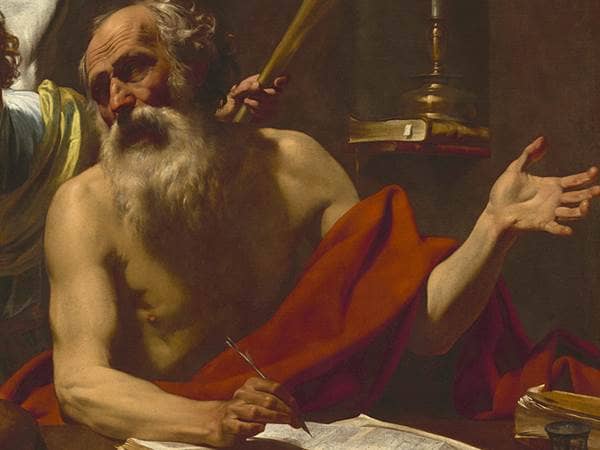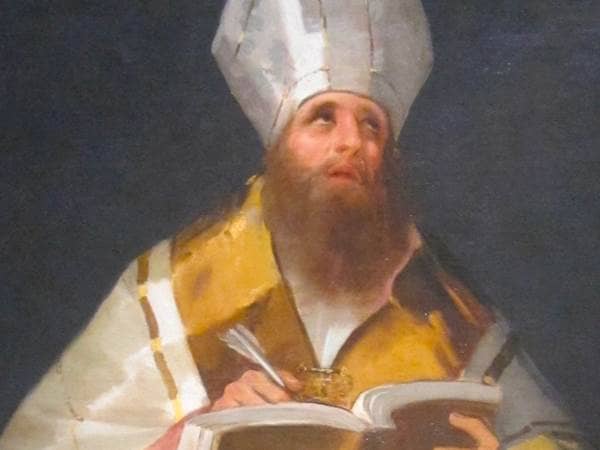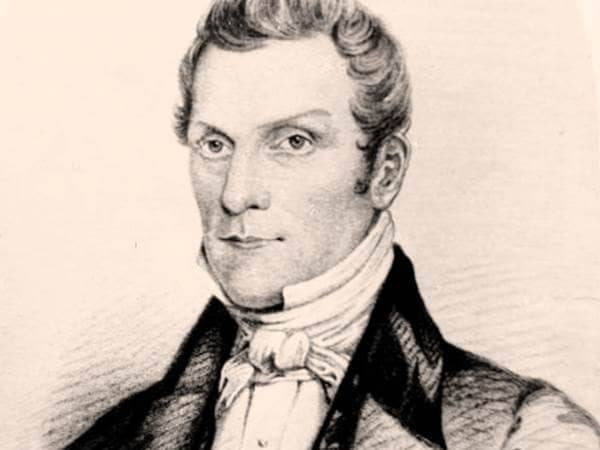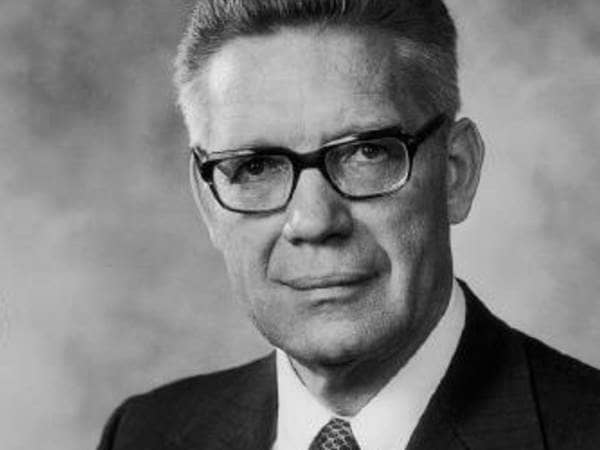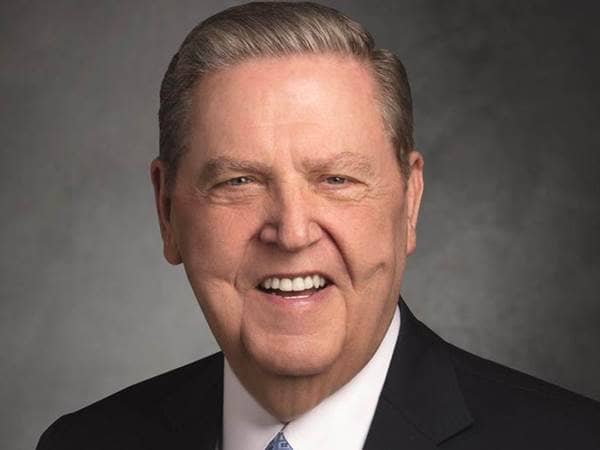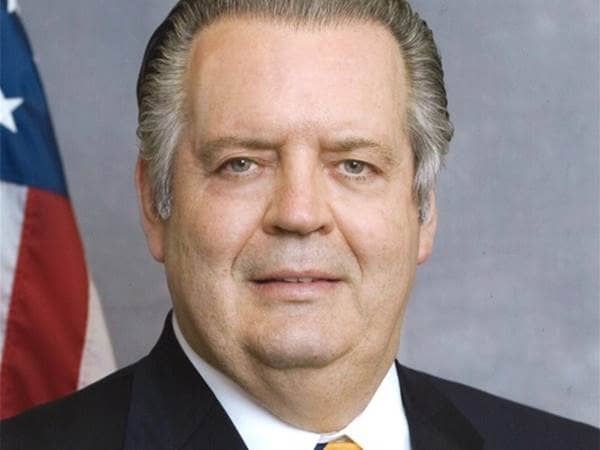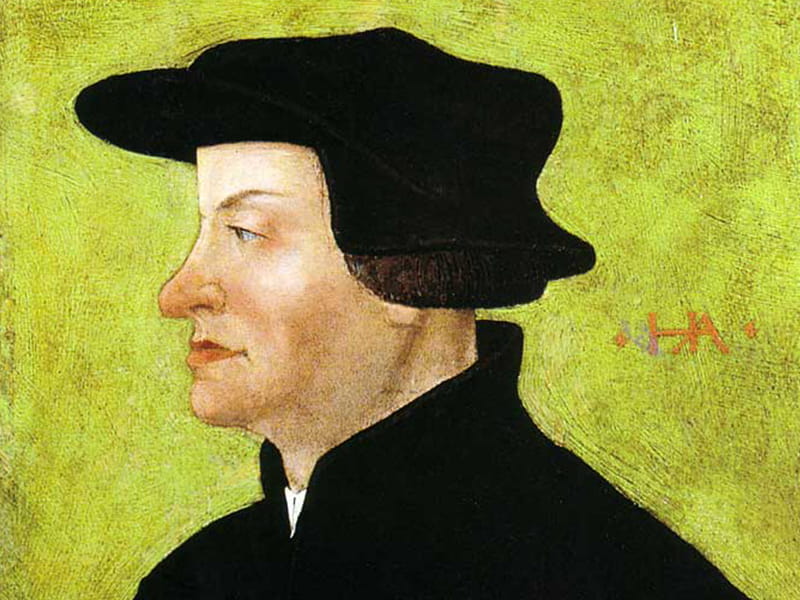
- Profession: Theologian
- Lived: January 1, 1484 - October 11, 1531 (Reformation)
- Nationality: Swiss
- Known for: Founder of the Reformed Church
The Reformed Church began with Huldrych Zwingli (1484-1531). His family members were prosperous peasants (so, like Luther, he belonged to the emerging middle class). He was educated at the University of Vienna and the University of Basel, which was a great humanist stronghold in the late Middle Ages (Erasmus had taught there). At the age of 22 he became a parish priest in Glarus, one of the smallest Alpine Swiss states. His experience as a military chaplain in 1513 and 1515 led him to oppose the mercenary system. (The economy of Switzerland, with few natural resources, relied heavily on hiring out its young men to fight for others.) While in Glarus he devoted himself to a humanistic study of the Bible and the Church fathers. At some point between 1514 and 1516 he returned to Basel to talk with Erasmus himself, whom Zwingli called "the most learned of all scholars." He bought Erasmus's Greek edition of the New Testament as soon as it was published, and taught himself Greek so he could read it.
In 1516 Zwingli became the priest at the Benedictine abbey in Einsiedeln, which was an important medieval pilgrimage site. Einsiedeln had a statue of the Virgin Mary, to which some people attributed magic healing powers. By 1516 Zwingli was convinced by Erasmus's principle that Christian belief and worship must be based on the word of God. He worried that people worshipped the statue instead of God. In general, the sale of indulgences and popular devotion to images made Zwingli fear that many people had forgotten that their salvation came solely from God. He became known for his scriptural preaching.
In October 1518, Oswald Myconius wrote Zwingli to inform him that the post of priest at the Grossmünster in Zurich (the main cathedral in German-speaking Switzerland) had become available. In December Myconius wrote again to say that several objections against appointing Zwingli had been raised, one of which he could not answer-that Zwingli had wronged the daughter of a prominent citizen of Einsiedeln. Zwingli's reply was not found until the 19th century. In his letter Zwingli reported that, despite great efforts, he had been unchaste, but that his unchastity was a thing of the past. He got the job.
Zwingli began on January 1, 1519, and immediately announced that he would depart from the lectionary, and preach straight through the Gospel of Matthew "from A to Z." This signaled a break with Catholic tradition, and a commitment to the Bible as the source of Christian life. In 1519, the year of Luther's debate with John Eck, Zwingli hailed Luther as the new Elijah. By 1522 he was preaching against indulgences, the penitential system, pilgrimages, the cult of saints, the worship of Mary, clerical celibacy, and monastic asceticism.
In January 1523, in what is known as the "First Disputation," the Zurich City Council endorsed Zwingli's teachings and his principle of scripture alone (sola scriptura). (Zurich was a free imperial city, which meant that it was ruled by an oligarchy that played the role that Luther's Prince Frederick played in Saxony.) In October at the "Second Disputation" the City Council decided that the Mass and the use of images in worship were unscriptural.
War eventually broke out between the Catholic and Protestant cantons (states) in Switzerland. Zwingli led the Zurich troops into battle and was killed on October 11, 1531 at the Battle of Kappel. Significantly, Luther remarked that ministers who went to war got what they deserved-he and Zwingli met just once and did not much care for each other. (Source: Patheos Religion Library)
In 1516 Zwingli became the priest at the Benedictine abbey in Einsiedeln, which was an important medieval pilgrimage site. Einsiedeln had a statue of the Virgin Mary, to which some people attributed magic healing powers. By 1516 Zwingli was convinced by Erasmus's principle that Christian belief and worship must be based on the word of God. He worried that people worshipped the statue instead of God. In general, the sale of indulgences and popular devotion to images made Zwingli fear that many people had forgotten that their salvation came solely from God. He became known for his scriptural preaching.
In October 1518, Oswald Myconius wrote Zwingli to inform him that the post of priest at the Grossmünster in Zurich (the main cathedral in German-speaking Switzerland) had become available. In December Myconius wrote again to say that several objections against appointing Zwingli had been raised, one of which he could not answer-that Zwingli had wronged the daughter of a prominent citizen of Einsiedeln. Zwingli's reply was not found until the 19th century. In his letter Zwingli reported that, despite great efforts, he had been unchaste, but that his unchastity was a thing of the past. He got the job.
Zwingli began on January 1, 1519, and immediately announced that he would depart from the lectionary, and preach straight through the Gospel of Matthew "from A to Z." This signaled a break with Catholic tradition, and a commitment to the Bible as the source of Christian life. In 1519, the year of Luther's debate with John Eck, Zwingli hailed Luther as the new Elijah. By 1522 he was preaching against indulgences, the penitential system, pilgrimages, the cult of saints, the worship of Mary, clerical celibacy, and monastic asceticism.
In January 1523, in what is known as the "First Disputation," the Zurich City Council endorsed Zwingli's teachings and his principle of scripture alone (sola scriptura). (Zurich was a free imperial city, which meant that it was ruled by an oligarchy that played the role that Luther's Prince Frederick played in Saxony.) In October at the "Second Disputation" the City Council decided that the Mass and the use of images in worship were unscriptural.
War eventually broke out between the Catholic and Protestant cantons (states) in Switzerland. Zwingli led the Zurich troops into battle and was killed on October 11, 1531 at the Battle of Kappel. Significantly, Luther remarked that ministers who went to war got what they deserved-he and Zwingli met just once and did not much care for each other. (Source: Patheos Religion Library)
Back to Search Results
